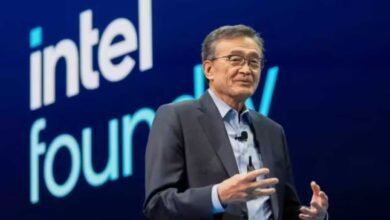Trump Signals Green Light for New Nvidia Chip Sales to China Under Controversial Revenue Deal

WASHINGTON — President Donald Trump indicated on Monday he may allow Nvidia to sell a scaled-down version of its next-generation artificial intelligence chip to China, a move that comes alongside an unprecedented deal requiring chipmakers to give the U.S. government a percentage of their revenue from such sales.
The announcement has sparked a significant debate in Washington, raising alarms among national security experts who fear that even modified U.S. technology could accelerate China’s military modernization.
Speaking to reporters, President Trump suggested a path forward for Nvidia’s new “Blackwell” chip, albeit in a modified form. “Jensen (Huang, Nvidia CEO) also has the new chip, the Blackwell. A somewhat enhanced-in-a-negative-way Blackwell. In other words, take 30% to 50% off of it,” Trump said, referring to a reduction in the chip’s computing power.
The President’s comments follow the administration’s confirmation of a rare agreement with Nvidia and AMD. Under the deal, the companies would give the U.S. government 15% of their revenue from the sale of certain advanced chips in China. This move represents a significant intervention by the administration into corporate affairs as it navigates the complex U.S.-China tech rivalry.
National Security Concerns Raised
The policy has drawn sharp criticism from those who advocate for stricter controls on technology exports to Beijing. Critics argue that allowing access to any version of cutting-edge U.S. chips could undermine America’s technological lead.
“Even with scaled-down versions of flagship Nvidia (chips), China could spend and buy enough of them to build world-leading, frontier-scale AI supercomputers,” warned Saif Khan, a former technology and national security director at the White House National Security Council under the previous administration. “This could directly lead to China leapfrogging America in AI capabilities.”
Context on Previous Chip Exports
This development comes after the Trump administration recently reversed a decision on another Nvidia chip, the H20. After halting sales of the H20 to China in April, the administration has since granted clearance for shipments to resume.
President Trump defended the decision and the new revenue-sharing deal by framing the H20 as outdated. “The H20 is obsolete,” he stated Monday. “So I said, ‘Listen, I want 20% if I’m going to approve this for you, for the country.’”
A U.S. official confirmed that the Commerce Department has begun issuing licenses for H20 sales, stating that Washington does not believe the chip compromises national security.
Company and International Response
When asked about the 15% revenue-sharing agreement, an Nvidia spokesperson said, “We follow rules the U.S. government sets for our participation in worldwide markets,” and added, “we hope export control rules will let America compete in China and worldwide.”
An AMD spokesperson confirmed the company had received approval for some AI processor exports to China but did not directly address the revenue deal, stating that the company adheres to all U.S. export controls.
China’s foreign ministry has previously condemned U.S. export controls, accusing Washington of using technology and trade measures to “maliciously contain and suppress China.”





